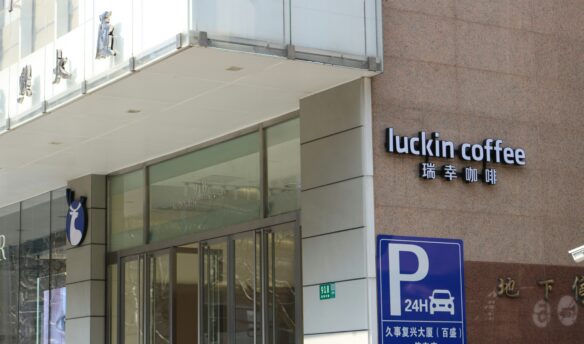To tip or not to tip? A group of coffee shops in Brooklyn get rid of gratuities. Plus, Cxffeeblack is bringing African baristas to the U.S., and science says coffee might be good for your heart.
Scroll down to read a happy unionizing story. Here’s the news for the week of September 23rd.
‘Cxffeeblack Is Bringing Baristas From Africa To America For The Barista Exchange Program’ – via Sprudge
After several years and lots of fundraising, the Memphis-based coffee and lifestyle company Cxffeeblack is ready to begin the second phase of its ambitious Barista Exchange Program.
The idea behind the program was to take a group of U.S. baristas to Africa to learn about coffee’s history and visit coffee farms during harvest, and then for a group of African baristas to travel stateside to learn from and experience U.S. coffee culture.
Cxffeeblack, co-founded by Bartholomew Jones and Renata Henderson, completed the first phase of the Barista Exchange Program in 2023: baristas traveled through Ethiopia, Rwanda and Kenya to learn about “pre-colonial Black Coffee culture, and collaborate on what the restoration of this generational thinking could look like for the diaspora 100 years in the future,” according to the Cxffeeblack website.
The second phase kicks off this fall as five baristas from Ethiopia, Rwanda, and Uganda travel to the U.S. for an “educational and cultural exchange,” according to a press release shared with Sprudge. The tour will stop at coffee shops in Memphis, Nashville, Atlanta, and Raleigh-Durham.
‘These Brooklyn Coffee Shops are Asking Customers to Stop Tipping’ – via Gothamist
Debates about tips and coffee shops—how much, should workers depend on tips to make up their wages, can customers handle price increases to make up the difference—have been raging for years. However, several cafes in Brooklyn have decided to opt out, taking a stand and removing the option to tip from their checkout process entirely, Kenneal Patterson reported for Gothamist.
Many cafe owners said removing tips means workers aren’t reliant on customers’ moods or being scheduled for busy shifts to determine how much they take home every week. No-tip policies can help create stability for workers in a traditionally unstable industry. “We pay the highest hourly wage that we can,” said Passionfruit Coffee co-owner Taylor Siok. “We offer consistent hours, and we don’t cut people short or send people home.”
Some customers are still struggling with the idea of no-tip spots, and whether or not they benefit workers can be difficult to parse out. For example, when workers at Compass Coffee in Washington, DC, decided to unionize, employees cited concerns over a no-tipping policy introduced in 2020 that didn’t correspond to an increase in pay.
“When you tip, you sometimes feel obligated, especially when they’re probably not paying them enough,” Christina LeMoines, a customer at Principles Coffee, told Patterson. But tipping can also lead to awkward customer-barista dynamics. “It’s a weird social thing—and there’s already enough weird social things to navigate.”
More and more shops in Brooklyn have implemented no-tip policies, coinciding with a rise in discourse around “tipping fatigue.” Jessica Dickler for CNBC cites “the rapid rise of tipping culture post-pandemic” across all sectors as a reason folks might be especially sensitive about tipping.
Since 2020, Dickler writes, “consumers face more opportunities to tip for a wider range of services than ever before, a trend also referred to as ‘tip creep.’” This has led to a decrease in tipping overall.
Most of the owners interviewed for the Gothamist piece said they’ve raised prices to pay their workers more, which has helped attract employees and alienated some customers. “There are people who you know are offended at my prices and feel entitled to cheaper coffee, and to be completely frank, those aren’t my customers,” said Katie Bishop of Principles Coffee House. “They don’t understand what I’m trying to do here, and I’m not trying to please everyone.”
More News
‘Coffee Growers Look to Postpone E.U. Deforestation Requirement’ – via Reuters
‘Fair Trade USA Founder Paul Rice Resigning as CEO’ – via Daily Coffee News
‘Taiwan Hosts First Cup of Excellence Competition’ – via Global Coffee Report
‘Arabica Coffee Futures Hit Highest Since 2011 on Supply Worries’ – via Bloomberg
‘Chapman University Hosting Coffee and Milk RTD Workshop’ – via Daily Coffee News
‘How the World’s Smelliest Fruit is Making Coffee More Expensive’ – via BBC News
‘Coffee Drinks on the Go Rebound as Workers Return to Office’ – via Bloomberg
‘Starbucks North America CEO Michael Conway Retiring After Five Months’ – via Daily Coffee News
‘In America, The Indonesian Coffee Bar Is Ready For Its Close-Up’ – via Sprudge
The Week in Coffee Unionizing
Workers at Quills Coffee in Louisville, Kentucky, have unionized. While many shops face monthslong fights with management to recognize their union, Quills CEO Nathan Quillo voluntarily recognized the union, representing 50 workers across seven locations.
“I started Quills Coffee to make space for everyone, where ‘coffee can build community,” Nathan Quillo said in a statement. “I’m grateful for the baristas and their positive approach to organizing. I appreciate their spirit of collaboration and look forward to building a new coffee community focused on a quality experience for customers and employees.”
Quills is the third Louisville-based coffee business to unionize. Workers at Sunergos and Heine Brothers have also organized but faced pushback from management and ownership. Sunergos workers went on strike to secure a contract, while Heine organizers filed numerous complaints against the company before finally agreeing on a contract.
Workers at Quills cited those previous campaigns as inspiration. “After seeing the positive impact that our fellow Louisville barista unions have made, we believe that forming an independent organization—a union—will help us all thrive,” barista Hope Roman said. “It’s not just about fair wages and respect; it’s about creating a better future for everyone at Quills.”
Coffee and the Climate Crisis
Coffee prices have increased recently, partially due to volatile weather patterns. Unseasonable frosts and now the worst drought in more than 70 years have impacted harvests in Brazil, and as the world’s largest coffee producer, what happens in Brazil has a significant influence on coffee prices.
Wildfires are raging across much of South America, and coffee farms are burning in Brazil. Silvio Almeida lost 2,000 of his 15,000 trees to one fire, which also destroyed his neighbor Rodrigues Martins’ farm. “Martins, 71, had 2,500 coffee plants on a small plot, now completely blackened by soot,” wrote Gabriela Sá Pessoa and Dee-Ann Durbin for the Associated Press. “The coffee he sells to a local cooperative is his livelihood and also pays for his son’s medical treatment.”
State Agriculture Secretary Guilherme Piai blamed the fires engulfing Brazil on “criminal gangs.” Environmental groups and scientists have linked the fires to deforestation. Deforestation drives climate change and results in more volatile weather patterns like droughts, impacting coffee production, and so on.
Almeida told the A.P. that the fire, combined with the unrelenting heat, impacted not just this year’s harvest but next year’s. “I won’t say it’s doomed, because with God anything is possible. But based on the situation, it’s already compromised.”
Is Coffee Good For You?
Drinking three cups of coffee daily could be good for your heart, according to research from China.
The study, published in the Journal of Clinical Endocrinology & Metabolism, found that people who regularly consumed a moderate amount of coffee had a lower risk of cardiometabolic multimorbidity (CM), which is defined as the co-existence of two or more health events like diabetes, heart disease, and stroke.
Researchers used 170,000 participants from the U.K. Biobank biomedical database. They found that regular coffee consumers reduced their risk of developing CM by 48.1% compared to those who drank little to no coffee.
According to the study authors, CM is an increasing public health concern as the world population ages. “The findings highlight that promoting moderate amounts of coffee or caffeine intake as a dietary habit to healthy people might have far-reaching benefits for the prevention of CM,” said the study’s lead author, Chaofu Ke from Suzhou Medical College of Soochow University in Suzhou, China.
Beyond the Headlines
‘Op-ed: Brewing the Next Generation of Coffee Enthusiasts in Producing Countries’ by Vava Angwenyi








